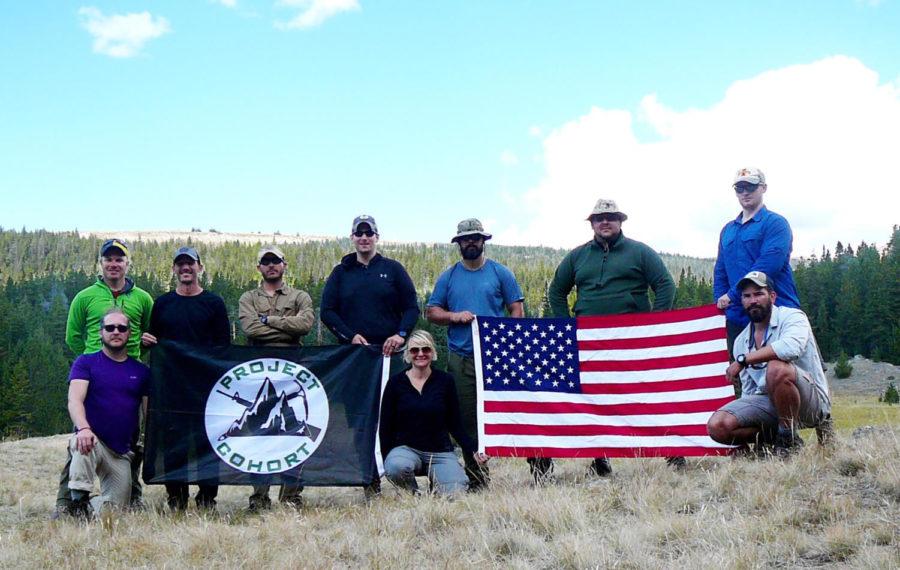- App Content
- App Content / News
- News
- News / Politics And Administration
- News / Politics And Administration / Campus
- News / Student Life
Veterans discuss how Project Cohort has changed them into their new selves
Courtesy of Iowa State Veterans Center
The Fall 2016 Cohort showing their pride in Cloud Peak Wilderness.
February 8, 2017
For many people, the first step into independence involves moving away from home to attend college or starting a new job.
For veterans Kieran Bowe, Iowa State alumnus, and Michael Gray, senior in horticulture, their first day on their own was spent being drilled and disciplined into the military lifestyle.
During basic training, and eventually active duty, Bowe and Gray made friends with their fellow military men and women, referring to them as brothers and sisters.
A life away from the military has left both men looking for a place to belong.
Project Cohort is a program that combines service projects, service learning and educational components in an effort to build a community among veterans.
The Project Cohort program focuses on building physical health using group outings such as wilderness retreats, like backpacking in Wyoming.
It also promotes healthy lifestyles, provides courses on finding a new purpose outside of the military and helps veteran establish mental goals.
Jathan Chicoine, director of the Veterans Center, explained that becoming a part of a cohort creates a sense of commodity and helps transition through higher education together with peer support.
Gray and Bowe have both experienced Project Cohort.
A cohort consists of a group of subjects, in this case students, that come together.
Gray said he found himself noticing people complain about things that seem small compared to what he has been through.
He decided he didn’t want to live with that negativity anymore.
When Gray learned about the program, he wanted to become a member of the cohort.
“Being a part of the cohort, you have an immediate connection with people who have been through the exact same thing as you, and you can just relax and listen to how they coped with the different struggles and such,” Gray said.
Bowe added that after they all took their first trip to the Bighorn Mountains in Wyoming. They were all given the opportunity to leave, but everyone decided to continue.
He said the cohort gave him opportunities to branch out and try new things.
They received confidence and were encouraged to move out of their comfort zones and leave the security of their daily lives.
“[The cohort members] have a greater understanding of what you have done and what you have gone through,” Bowe said.
Gray and Bowe discussed what it was like to be a veteran first, and then later become a student.
“Whether you come back home, go to a new place or go to a new school, people have either changed, moved away or you are in a new place all together,” Bowe said.
Gray said the Army made sense, and college lacked the structure that the Army had. It sometimes created a sense of failure at difficult times.
“It’s like walking without bones at times,” Gray said.
Project Cohort created a defined purpose for the veterans.
It was difficult for Bowe and Gray to meet new people before the cohort because they had unique life experiences and were much older than everyone else.
The cohort created a shared vision for the veterans, so they all knew they weren’t going through it alone.
“There is this estrangement to society,” Gray said. “When you get thanked for these things, it’s hard to relate to.
“When people, who aren’t a veteran see something like this, I think it would be a good way for them to acknowledge that my burden will never be one that is understood by everyone, and I don’t expect it to or want it to. But if there is a way that they can contribute and say hey, I hope that works for you and I hope that helps you, even if their only support is to even just smile. I think that’s a pretty awesome thing.”
Bowe said he believes that veterans cannot express the appreciation they have for people making an effort to show they care, but it doesn’t always reach the roots of the daily issues that some of the veterans in the cohort face in their daily lives.
“A year ago, I would have told you I felt like a college student totally out of my element, but after making these connections, I feel more genuine and I found that focus and yeah, I’m a veteran, but now I am more of an individual with a focus,” Gray said. “If there is even for a second a doubt that someone should join, I think that is exactly the reason they should.”







